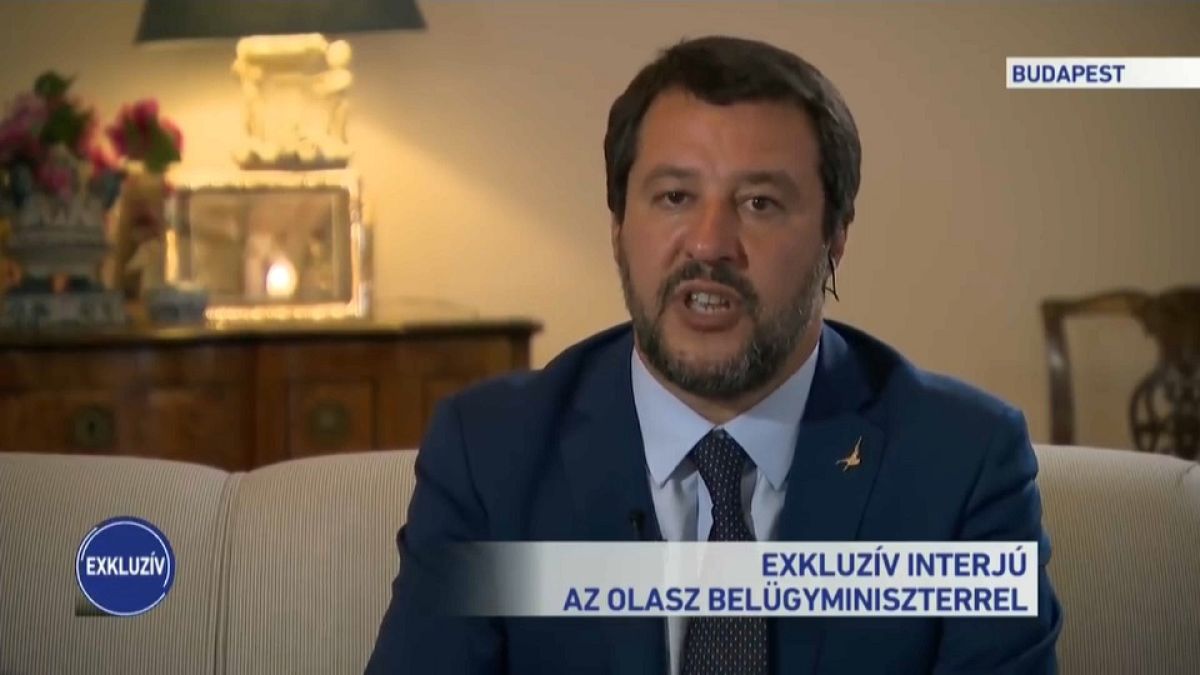While visiting Hungary on Thursday, Italian Interior Minister Matteo Salvini from the far-right League party gave a controversial interview to the Hungarian national television. Euronews has fact-checked some of his contentious assertions.
While visiting Hungary on Thursday (May 2), Italian Interior Minister Matteo Salvini from the far-right League party gave a controversial interview to Hungarian national television.
Among other contentious assertions, Salvini said some European capitals were in the hands of Islamic minorities. "If we do not take back control of our roots, Europe will become an Islamic caliphate," the Italian leader said.
During the talk, Salvini accused left-wing governments of "transforming the Mediterranean into an open-air cemetery."
While emphasizing the importance of "environmental protection," Salvini merely defined it as "defending our agriculture and trade from the flow of goods and products from other countries".
Salvini was interviewed by journalist Balázs Bende.
The following day (May 3), Orban recorded his usual Friday interview on the radio and he said: "Hungary defeated immigration by land, Italy by sea. Salvini hammered a nail in the coffin of pro-immigration policies. Hungary joined with a smaller nail".
While a lot of Salvini's political rhetoric is unverifiable, Euronews has fact-checked his comments in collaboration with immigration experts where possible.
Migration to Italy reduced by 93%, says Salvini
Bende: "I am under the impression that leaders in Brussels are a bit afraid of you. You decided to stop migration by sea and you succeeded more or less. You have said you would change the European Union and find allies for that. They said it was impossible. But in recent weeks, you managed to find many allies**.** You want a full-fledged reform of the EU with new leaders. Are they afraid of you in Brussels?"
Salvini: "Yes, because Italy has finally raised its head. We were told that we could not change the pension law and we changed it; that we could not make a tax reform, and we did it; that we could not stop illegal immigration, and we have done it. To date, landings to Italy have been reduced by 93% and in Brussels, they were not used to this Italy [...]
Hungary's barbed wires solved migration problem, says Salvini
Bende: "You are attacked constantly. Let me quote a headline regarding your visit to Budapest and leader of the Austrian Freedom Party Heinz Christian Strache's upcoming visit. A Hungarian website wrote that it was 'a monsters' ball. The dismantlers of Europe are meeting in Budapest.' How do you cope with these personal and political attacks?"
Salvini: "I am used to attacks from the left, from the left-wing press and television both in Italy and in Europe. They are afraid because we have focused on family, work, youth, environmental protection and security. [...] I saw first-hand how Hungary has protected the border with barbed wire hundreds of kilometres long, solving the problem. In Italy, the policy of blocking arrivals has halved the number of deaths and disappearances."
Security issues 'absolutely' linked to illegal migration, says Salvini
Bende: Is the issue of security linked to illegal migration?
Salvini: "Absolutely yes. By now it has been proved that delinquents and terrorists infiltrated the ships arriving in Italy, and then went on to commit massacres in other European countries. Our policy of blocking illegal immigration in Italy is at the service of all of Europe, France, Spain, Germany and Brussels. They give lessons but the serious policies of both Hungary and Italy save them."


